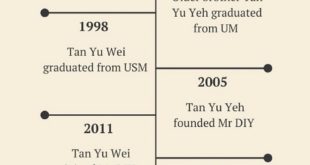
Author’s Blurb: Thankfully, I haven’t been bitten by the travel bug yet despite staying home throughout the MCO (I haven’t even left home for groceries), but I know some people are itching to travel once it’s allowed again. For now, however, the tourism industry is suffering. But just how badly is it doing? Can something be done about it?
With those questions in mind, Vulcan Post reached out to 3 tourism/travel startups to get some insight on the situation for them.
We managed to get a hold of:
By now, it’s probably clear how the tourism industry has been impacted, but what have these startups been doing about the situation?
The Bleak Picture
One of the biggest negative impacts has of course been to the number of tourist arrivals, with customers cancelling or rescheduling their travel bookings on Klook, Emily shared.
It’s the same for LokaLocal, and Rachael added that with Visit Malaysia 2020 getting cancelled, all their upcoming campaigns had to be put on hold as well.
For Tourplus, Rickson told us that they had predicted the impact of the coronavirus outbreak as early as January, as it had already impacted their plans to enter China’s market.
The reduction of travellers inbound from China has been a big hit to the travel industry, he shared, adding, “We were forced to change our target market to other foreign markets, but in February as the coronavirus outbreak expanded, all other foreign cities went on lockdown as well and travel became limited.”
Even if people had still wanted to travel, governments were beginning to ban it.
To help cushion the impact, LokaLocal began discussions with MDEC to see how they could promote and transform tourism through digital innovations.
Meanwhile, looking to ease fear and uncertainty on the part of their customers, Emily informed us that Klook allowed customers who had booked activities with a participation date until April 30, 2020 to reschedule or seek a refund on their purchase.
Weathering The Storm
With regards to their own employees, Klook ensured that they could provide a safe workplace and virtual infrastructure to empower them to continue performing at a high level.
“In Malaysia, we have implemented a mandatory Work from Home (WFH) policy before the announcement of Movement Control Order (MCO),” Emily said.
“The team is also leveraging this period of time to kickstart several internal projects to brush up skill sets that can equip them for the market rebound.”
For Tourplus, Rickson acknowledged that these are tough times, but he hopes that the team can stay with the company.
“Hence, we’re offering different options including pay cuts and Employee Stock Ownership Plan (ESOP) to those in the team who would like to stay together,” he added.
Dictionary Time: An ESOP is a kind of employee benefit plan, similar in many ways to qualified retirement plans and governed by the same law (the Employee Retirement Income Security Act). ESOPs are funded by the employer, not the employees. Stock is held in a trust for employees meeting minimum service requirements and allocated to employees based on relative pay or a more level formula, then distributed after the employee terminates.
Over at LokaLocal, one of their goals during this crisis is to avoid layoffs where possible as well. Therefore, their team has agreed to take a temporary 10-50% pay cut, with some reducing their hours.
In a statement, CEO Chin Yoon Khen shared that they have even moved offices to lessen their financial burden.
“We’re doing our best to manage our costs and operate in a leaner mode until the situation improves, and when we can make it work through our alternative revenue stream,” Rachael told us.
Tourism Will No Longer Be The Same
Rachael shared that at LokaLocal, they’re anticipating that even after the MCO gets lifted, it might take some time for the tourism sector to warm up again.
“The truth is, tourism won’t be the same again after this outbreak. As a tech company, we have to adapt to these changes to stay relevant and stay ahead,” she said.
“Our team is realigning our strategies to embrace even more digital approaches, which we plan to launch later on in the year.”
Earlier this year, they had launched a content and marketing arm called MY 360 Playbook that raises awareness for local destinations while helping businesses through video marketing and branded content.
Now they’ve also initiated their Online Experiences, where people can connect to LokaLocal’s pool of local experts virtually via online classes and webinars. The types of experiences offered an range from joining an Ayurveda session to taking a virtual visit to Kampung Baru.
On the other hand, Tourplus is considering partnering with local retailers to use Tourplus’ guide resources to help them bring in more income.
However, the project will only really be able to take effect when the rebound happens, as Tourplus can only build its foundations for now, Rickson said.
Klook Malaysia has also been exploring ways to provide further support for their merchants and partners, working directly with them to implement flexible policies and processes.
“As part of our recovery plan, we are also working closely with various partners including tourism boards around the world to leverage on Klook’s data to bridge the gap and curate better travel experiences for different segments of travellers in the future,” Emily concluded.
Bottom Line: While some of them may not be able to roll out immediate initiatives to maintain cash flow, none of them are staying stagnant and tiding it out. Whether it’s upskilling or working on the foundations of a new project for the future, there’s always something to do that could beneficial in the long run.
- You can read more on what we’ve written about the MCO here.
Featured Image Credit: Vulcan Post / Tourplus / Rachael Lum LinkedIn



